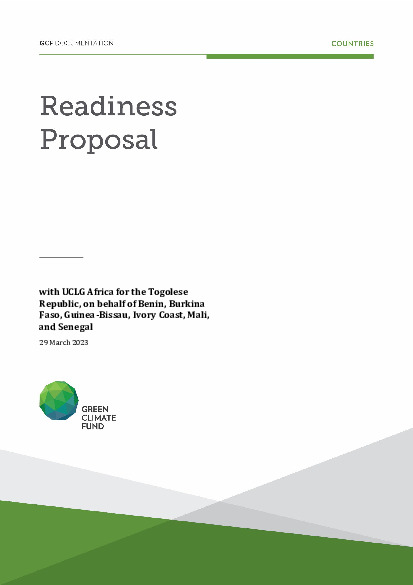Strengthen WAEMU sub-national governments’ capacities to access climate finance and develop a pipeline of projects to support their countries’ climate goals.

Strengthen WAEMU sub-national governments’ capacities to access climate finance and develop a pipeline of projects to support their countries’ climate goals.
The WAEMU (West African Economic and Monetary Union) 1 Regional Forum was held in June 2021 by the Covenant of Mayors for Sub-Saharan Africa (CoM SSA), and United Cities and Local Governments of Africa (UCLG Africa) in collaboration with the Government of Togo, the West African Economic and Monetary Union (WAEMU), the BOAD bank, UNDP, and Expertise France, under the title “Strengthening the Resilience and Increasing the Climate Ambitions of Local and Regional Governments in Africa”. The Forum asserted the important role of local governments in the collective effort to address climate change at a national scale and called for a regional readiness grant proposal to mobilize resources for local governments, to enable them to play a central role in stimulating the economy in a manner that is compatible with Sustainable Development Goals and the national climate change agenda.
The NDCs of all WAEMU countries highlight the role WAEMU local governments need to play in their respective countries to achieve their climate goals. It is not yet evident that sub-national governments have been sufficiently engaged to contribute toward that goal. The Global NDC Outlook Report (2019) emphasized this issue when it highlighted the need for countries to mainstream their NDCs into sub-national policies and budgets and indicated that this would be critical in contributing to the joint effort in attaining the global goals set in the Paris Agreement of temperature increase limit, and in adaptation, and finance.
Nevertheless, the WAEMU subnational governments face several difficulties in understanding the challenges of climate change at the local level hence their inability to integrate CC in local development planning; the gaps can be summarized below :
-
Governance and Coordination Gaps:
-
Gap#1: Lack of a centralized and effective coordination mechanism, communication and consultation processes between sub-national governments and the state institutions that administer national climate change programming; and;
-
Gap#2: Lack of awareness and “Know-How” of subnational governments to integrate CC into local development planning.
-
-
Technical and Financial Capacity Gaps:
-
Gap#3: Lack of technical capacity and financial "know-how" at the sub-national and local levels to mobilize climate finance for CC programming.
-
Gap#4: Lack of technical capacity to access, manage and execute climate funds at the subnational and local levels;
-
Gap#5: lack of capacity to capture learning, and best practices and to communicate climate change knowledge, climatic impacts, and countries’ commitments.
-